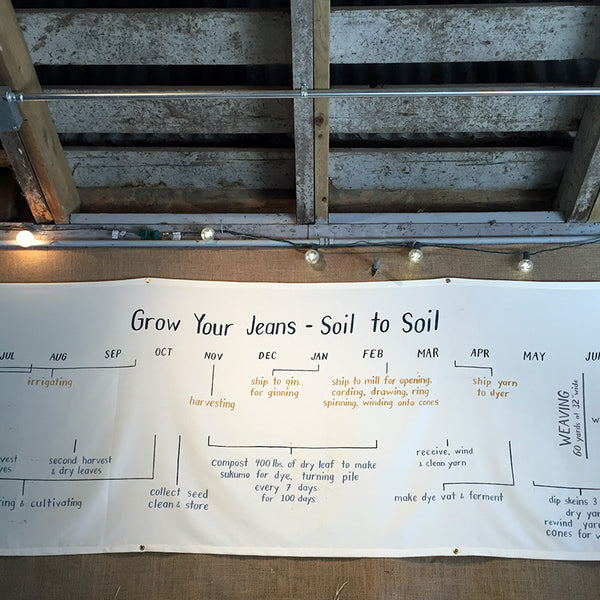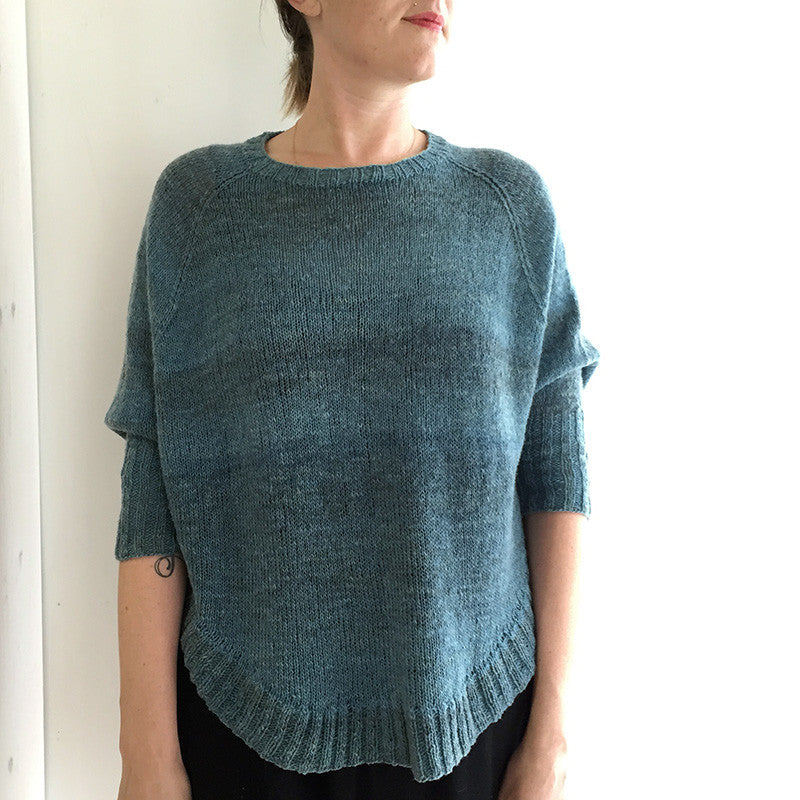
Sneaking in a blog post, as we round the bend on this amazing month - October 2015 - the release of my first book, The Modern Natural Dyer, my trip to Rhinebeck and NYC to present my book, and the first year of Slow Fashion October.
The theme of Slow Fashion October's final week is Known - in a nutshell, Karen has asked people to share their favorite sources of yarn which has either been milled by the owners of the sheep also known as farm yarn, or by companies who have connected with farmers and made yarn with their wool, like we do here at Verb.
While farm yarn has been around for centuries, and there are those of us who have been obsessed with it for quite some time, there has been an increased interest by the general knitting public to know more about where their yarn comes from, and the desire to support US farms. Some of the reasons to explain this are the fact that there are a significant body of us who have been knitting for quite some time. At some point, while knitting, purling, and practicing every type of construction is fun, it is engaging to go deeper, and to learn more about the materials, and how to apply technique to materials to make the best cloth for the project at hand. The slow food movement, of knowing the sources of where food is grown, being familiar with the people who grow it, and eating seasonally, and the US-made movement is more widespread. Five years ago, Quince & Co and Brooklyn Tweed began, each company has a killer combination of gorgeous US made yarn, beautiful graphic design, and fashion-forward knitting patterns, their popularity has created dialogue around traceability and sources.
Though when it comes to fabric ::screeching brakes::
As those of you who have visited the Verb brick and mortar, half of the shop is fabric (the other half yarn). When shopping for fabric, 98% of the fabric I have come across, I have no idea where it is made, by whom, or where the materials are made. I take that back. I may know the country the fabric is made in (India / China / Korea / Japan), but I don't know more than that. This has put a serious crimp in our fabric style, and has taken me much longer to develop this side of Verb's business. Not to mention that in the past four years (2015 has been different) general sewer's who come to Verb don't seem to be very interested, or they may be interested up until a certain price point. Money is real, budgets are real, life is complicated between family, mortgages, education. I get it. Though I want to make that point, as it has been interesting the world of yarn, to see the evolution, and that it has taken (a) time, (b) interest from the consumer side, and willingness to spend more money per skein of yarn and for patterns (c) interest from the business side, (d) an expansion of price points, as people bring their various business models to the table, so to be able to appeal to a wider populace. This is getting more business-y than I expected. I can continue to chat about this in the future if you are interested. But for the moment, let's bring it back to fabric, pure and simple.
 After five years, as in everything we do, there is the mind's eye, and then there is reality. If anything, having a business which is both a store front and producer of goods, I have learned and am continually reminded things take time and it is a gradual progression. In my mind's eye, we would be able to source all the materials (certified organic if cotton, from known farmers if wool, with a track record of treating their animals with dignity, as stewards of the land) to make fabric within the US, and to make fabric in the US, that people would like, and purchase, to make beautiful things. I would like this option. That said, there are various communities around the world, with tremendous cultural and textile legacies that I would love to support as well. I think the bottom line, is knowing that the people who are making the textiles, and the animals and plants producing the materials, are taken care of in a humane, ecological way.
After five years, as in everything we do, there is the mind's eye, and then there is reality. If anything, having a business which is both a store front and producer of goods, I have learned and am continually reminded things take time and it is a gradual progression. In my mind's eye, we would be able to source all the materials (certified organic if cotton, from known farmers if wool, with a track record of treating their animals with dignity, as stewards of the land) to make fabric within the US, and to make fabric in the US, that people would like, and purchase, to make beautiful things. I would like this option. That said, there are various communities around the world, with tremendous cultural and textile legacies that I would love to support as well. I think the bottom line, is knowing that the people who are making the textiles, and the animals and plants producing the materials, are taken care of in a humane, ecological way.
The person who most closely resembles this ideal, who is currently making fabric, is Natalie Chanin of Alabama Chanin. It is her company, and the fabric they make, which has saved our fabric program at Verb, and is the reason we still have fabric in our shop. AC makes 100% organic cotton jersey. The cotton is grown at a co-operative in West Texas. The fabric is ginned, carded, spun, knit and dyed in the Carolinas. We have a line of khadi from India, which is made in the Great Rann of Kutch, the place where I lived in India, where industry tends to be pretty small. It is made of organic cotton, which is nearly unheard of in India, so I really like to support their endeavor. Currently, we have line of fabrics made from cotton grown by Sally Fox and milled in Japan. I tend to give fabrics made in Japan a thumbs-up, since I feel like there are labor laws similar to those in the US, though I am not entirely sure. I have never been to Japan and would love to go to see first hand the cultural and labor practices surrounding everything from factories to small workshops. We also carry Pendelton - made of US wool, scoured, spun, and woven in the US. While I feel like our current fabric selection is more representative of my mind's eye, over the course of 2016, we will be working on creating more fabrics made from traceable materials and manufacturing practices.
Another movement occurring over the past 5+ years is Fibershed. Founded by Rebecca Burgess, this non-profit organization is dedicated to creating the foundation and sharing of resources to creating locally-made clothing, from locally-grown materials. I have been fortunate to have this movement in my Bay Area backyard. Fibershed has helped me to realize my dreams of having locally-grown indigo, and has been a tremendous resource to bring together farmers, so we can source local wool more easily. In the next couple of weeks, we will release our first line of yarn made from locally-made wool and dyed a full rainbow of colors with locally-grown plants.


Much of Fibershed's course of study and practice has been aimed at accomplishing the goal of making jeans from local materials and production. This October, they achieved that goal! Referred to as Grow Your Jeans, Fibershed held a party to celebrate on a beautiful farm in the remote, idyllic, ocean-side, town of Bolinas. With redwoods overhead, there was an absolute cornucopia of the most amazing food and drink.


As the sun set, everyone gathered in the barn to watch a fashion show, featuring the jeans. Fibershed asked a group of us to create tops made from locally grown and dyed materials. I collaborated with Julie Weisenbeger of Cocoknits. We used her handknitting pattern Veronika with our yarn, Flock, dyed with local indigo, to create a sweater.

On display, a flag modeled after the original American flag, the weft of the flag, made of hemp, grown by veterans in Kentucky, the warp, made of organic cotton grown by Sally Fox. The hemp was naturally dyed. The flag is handwoven. From here the flag will be gifted to Willie Nelson, for his support of Farm Aid.
I honor Fibershed's work - and all those who are trying to make a difference in raising consciousness about textiles - as it really is as important to know where your clothing comes from, and who makes it, as it is to have a connection to the food which you eat - for the health of the planet, for animal rights, and for human rights. I hope Karen continues this discussion and I look forward to Slow Fashion October 2016!
In the comments, please feel free to add your favorite fiber sources and fiber stories.
---------------------------
Did you see there is a blog tour for The Modern Natural Dyer? Your chance to win a copy of The Modern Natural Dyer - and a natural dyeing kit!
Upcoming: The Fibershed Fine Wool and Fiber Symposium, Saturday, November 7th, 9:30-6pm. Click here for tickets.
We are now on Periscope as AVFKW - we just made two videos on using local, natural dyes, check it out, as the videos will expire in the next couple hours.
Join us on our journey! Search #themodernnaturaldyer on Instagram to connect with other aspiring natural dyers!


